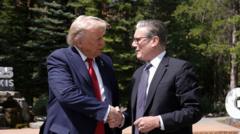Will the New UK-US Tariff Deal Address Steel Concerns?

A Historic Trade Agreement: Impact of the US-UK Tariff Deal on Key Industries
The recent trade agreement between the United States and the United Kingdom marks a significant shift in international trade relations. With the new deal now in effect, British car manufacturers are set to gain preferential access to the US market, which is recognized as the largest consumer market in the world. This agreement not only reduces tariffs on automobiles and aerospace exports but also introduces changes that could shake the foundations of various industries. However, the deal comes with its own set of challenges, particularly for the UK bioethanol sector and steel and aluminium industries. This article delves into the specifics of the agreement, its implications for different sectors, and the broader context of international trade relations.
Understanding the Key Components of the US-UK Trade Agreement
To fully grasp the implications of the US-UK trade deal, it’s essential to break down its key elements:
1. Tariff Reductions for the Automotive Industry
The agreement allows UK car manufacturers to sell up to 100,000 vehicles annually to the US at a significantly reduced tariff rate of 10%. This is a substantial drop from the previous 27.5% tariff, providing British carmakers with a competitive edge over international rivals. The provisions of this deal are expected to:
- Boost sales for UK car manufacturers in the lucrative US market.
- Encourage investment in the UK automotive sector, potentially leading to job creation.
- Strengthen economic ties between the US and UK, fostering a more collaborative business environment.
2. Aerospace Sector Benefits
In addition to the automotive industry, the aerospace sector stands to benefit from the removal of tariffs. The elimination of tariffs on UK aerospace exports is expected to:
- Enhance the competitiveness of UK aerospace firms in the global market.
- Facilitate smoother trade relations and partnerships between UK and US companies.
- Contribute to the protection of thousands of jobs within the aerospace sector.
3. Changes in the Bioethanol Sector
While the agreement offers substantial benefits to the automotive and aerospace sectors, it has raised concerns for the UK bioethanol industry. The UK will eliminate a 20% tariff on US ethanol imports and increase the quota to 13,000 tonnes, allowing up to 1.4 billion litres of US ethanol to enter the UK tariff-free. This shift is viewed as detrimental to the British bioethanol producers, who may struggle to compete against cheaper imports. Key implications include:
- Potential reduction in UK bioethanol production and job losses in the sector.
- Increased reliance on US ethanol, raising questions about energy security.
4. Steel and Aluminium Tariffs: A Complicated Scenario
Despite the positive changes in other sectors, UK steel and aluminium products remain affected by a 25% tariff. This figure could potentially double to 50% if an agreement is not reached before the impending deadline on July 9. These tariffs pose significant challenges for the UK steel and aluminium industries, which are already grappling with global competition. Implications of this ongoing situation include:
- Increased costs for UK manufacturers relying on steel and aluminium.
- Potential retaliation by the UK against US products, leading to a tit-for-tat trade war.
Global Context: The Wider Implications of the US-UK Trade Agreement
The US-UK trade agreement takes place against a backdrop of shifting global trade dynamics. The deal reflects broader trends in international relations and trade, marked by increasing protectionism and competition among nations. As countries navigate complex trade landscapes, several factors come into play:
1. The Role of the G7 Summit
The agreement was signed during the G7 summit, a gathering of the world's leading economies that seeks to foster collaboration on global issues. The summit serves as a platform for addressing pressing trade matters, and the successful negotiation of the US-UK deal highlights the potential for cooperation among nations. The implications of such agreements extend beyond bilateral relations, influencing global trade policies and practices.
2. Trade Negotiations with Other Nations
In addition to the UK, the US is engaging in trade negotiations with several other countries. Thailand, for example, is in talks to reduce tariffs on goods imported into the US. These negotiations indicate a growing trend of countries seeking to secure favorable trading conditions with the US, potentially reshaping global trade patterns. The outcomes of these discussions may significantly impact various sectors worldwide.
3. The Impact of Tariffs on Global Markets
Tariffs have far-reaching consequences on global markets, affecting supply chains, prices, and consumer choices. The imposition of tariffs by the US has already caused disruptions and uncertainty, prompting countries to rethink their trade strategies. The recent deal with the UK could serve as a roadmap for other nations looking to broker similar agreements, but it also raises concerns about the potential for escalating trade wars.
Future Considerations: Navigating the Post-Agreement Landscape
As the US-UK trade agreement takes effect, industries on both sides of the Atlantic must prepare for the evolving landscape of international trade. Here are some key considerations for businesses and policymakers moving forward:
1. Monitoring Economic Indicators
Businesses must keep a close eye on economic indicators that could signal changes in consumer demand, production costs, and market competitiveness. Understanding these dynamics will be critical to navigating the post-agreement environment successfully.
2. Engaging in Strategic Planning
Firms should develop strategic plans that account for the new tariff structures and market conditions. This involves assessing supply chains, exploring new markets, and diversifying product offerings to mitigate risks associated with tariff fluctuations.
3. Fostering International Collaborations
Collaboration between UK and US businesses can yield mutual benefits, from shared expertise to joint ventures. Establishing connections and partnerships will be essential in maximizing the advantages of the new trade agreement.
4. Advocacy for Fair Trade Practices
Industry stakeholders must advocate for fair trade practices that protect domestic interests while fostering international cooperation. Engaging with policymakers and participating in trade associations can amplify their voices in shaping future trade policies.
Conclusion: Navigating the Future of US-UK Trade Relations
In conclusion, the US-UK trade agreement represents a pivotal moment in international trade relations, bringing both opportunities and challenges. While the automotive and aerospace industries stand to gain significantly, concerns remain for the bioethanol sector and the steel and aluminium industries. As the global trade landscape continues to evolve, businesses must adapt to new realities and seek ways to thrive within the framework of the agreement.
As we move forward, the key question for businesses, policymakers, and consumers alike is: How will this historic deal shape the future of trade between the US and UK, and what strategies will be most effective in navigating the challenges that lie ahead?
FAQs
What are the main benefits of the US-UK trade agreement?
The primary benefits include reduced tariffs for UK car manufacturers and the aerospace sector, allowing for increased competitiveness and job protection within these industries.
How does the agreement affect the UK bioethanol industry?
The agreement eliminates tariffs on US ethanol imports, which may negatively impact the UK bioethanol sector's ability to compete against cheaper US products.
What are the current tariffs on UK steel and aluminium?
Currently, UK steel and aluminium are subject to a 25% tariff, which could potentially increase to 50% if an agreement is not reached by the deadline.
The US-UK trade agreement opens new avenues for collaboration but also presents challenges that require strategic planning and adaptability. What steps do you think businesses should take to capitalize on this agreement effectively? #TradeRelations #USTariffs #UKEconomy
Published: 2025-06-30 07:03:09 | Category: technology



